Share
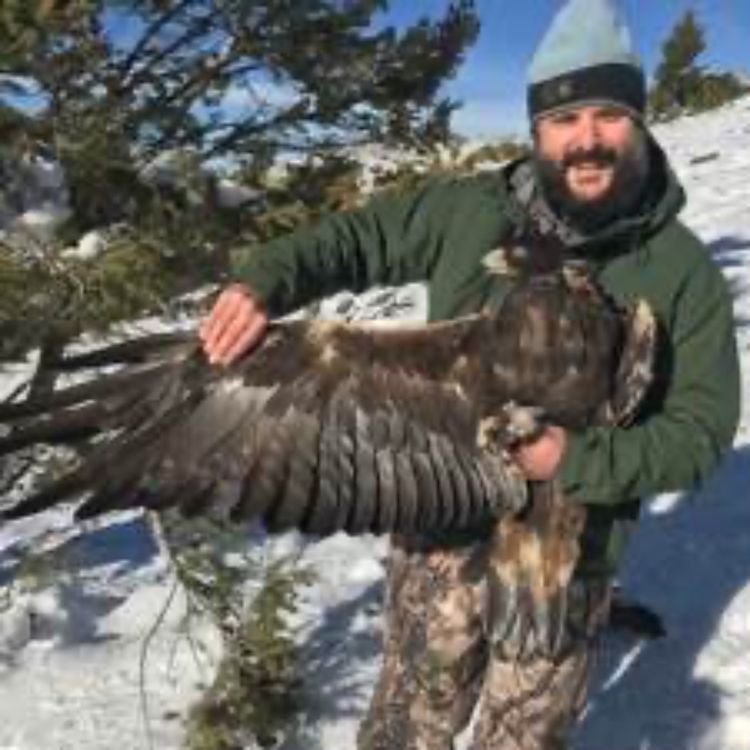
The Trail Less Traveled
Demographic implications of lead poisoning for eagles across North America with Dr. Vince Slabe
This week we sit down with a raptor ecologist who is informing the nation through his in depth research regarding the demographic implications of lead poisoning for eagles. Over the past year, his paper has been featured in National Geographic, The New York Times, Popular Science, The Wall Street Journal, and many more.
Mandela recently collaborated with him on a lead-free ammunition shooting demo in Livingston and they recorded this interview afterwards!
"Demographic implications of lead poisoning for eagles across North America"
This paper published in Science, which was lead by Dr. Vince Slabe, is the first to show continent-wide demographic consequences of chronic lead poisoning on Bald and Golden Eagles. It was found that nearly half of studied eagles exhibited chronic lead poisoning, and that lead poisoning is a barrier to the growth of eagle populations across North America.
Vince is originally from central Illinois and graduated with a B.Sc. and M.Sc. from the University of Illinois. Shortly after, he travelled west and quickly developed a strong interest in bird research. Vince worked on multiple avian research and monitoring projects in California, Idaho, Montana, Oregon and Wyoming before completing a Ph.D. at West Virginia University in Forest Resources Science. Vince’s dissertation focused on lead poisoning of bald and golden eagles on a nationwide scale.
At CSG, Vince is focused on running non-lead ammunition programs and studying if the increased use of non-lead ammunition results in reductions of bald and golden eagle mortality. Additionally, he is working on a project studying movements of golden eagles in Alaska. Vince is a member of the Raptor Research Foundation, the Eastern Golden Eagle Working Group, and serves as an associate editor for the Journal of Raptor Research.
Vince and his family live in Montana. When not working, Vince enjoys spending time with his family, floating the river, birding, cross-country skiing, fishing, hunting, biking and listening to Chicago Cubs baseball.
More episodes
View all episodes
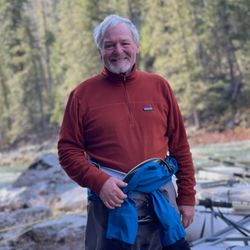
Selway River Adventures with Doug Proctor
34:11|Doug Proctor grew up just outside Cincinnati, Ohio, where his love for rivers was seeded early in life. As a boy he spent years canoeing with his family and through the Boy Scouts on class one rivers across southern Ohio, Indiana, and Kentucky. At the age of 12 he embarked on his first extended canoe trip—a two-week wilderness journey in Kentucky that helped shape his lifelong passion for river travel and backcountry adventure. In 1977 Proctor began his professional guiding career, leading whitewater rafting trips commercially on the New Riverand the Gauley River, two of the eastern United States’ premier whitewater destinations. Over the next 35 years he built extensive experience as an outfitter in West Virginia, guiding trips through challenging Class III and Class IV waters and cultivating deep skills in river stewardship, guest experience, and wilderness logistics. His love of rivers and adventure didn’t stop in Appalachia. His guiding has taken him to Grand Canyon, Alaska, Chile, Costa Rica, Idaho, and numerous rivers in both the eastern and western United States. These experiences helped refine his craft as a guide renowned for both technical competence and a commitment to sharing wild rivers with thoughtful guests. Today Proctor is co-owner of Selway River Adventures, a wilderness rafting outfitter based in Stanley, Idaho. With his partners he operates under one of the extremely limited commercial permits on the Selway River, a nationally designated Wild and Scenic river flowing through the Selway-Bitterroot Wilderness. Trips are typically five to six days long, weaving technical whitewater with solitude and natural beauty few river runners ever get to experience. Proctor now lives in Stanley with his wife Cathy and their dogs, drawn to Idaho by the remarkable concentration of great rivers in the region. Guiding river trips for over 40 years, he views sharing his experience with guests and friends as not just a profession but a deep passion—one rooted in the rhythms of wild water and the stories those rivers tell. Show notes: 00:03:51 - The Selway River: Permit System and Access00:05:56 - From Boy Scouts to River Guide Entrepreneur00:07:56 - Class 6 Rafting Company Origin Story00:09:59 - Selway River: Protected Wilderness and Rafting History00:12:24 - Early Spring Wildlife and River Adventure00:15:41 - Protecting Rivers and Wilderness Areas00:17:56 - Selway River Adventures Trip Overview00:19:38 - First-Time River Trips Need Only Willingness00:21:41 - Wildlife Abundance on the Selway River00:24:23 - Salmon Extinction Crisis and Dam Removal Solutions00:26:27 - Selway Lodge History and River Adventures00:28:21 - Epic River Adventures in Alaska and Beyond00:30:19 - Doug's Eighth Grade Singing Trauma00:31:53 - Three Pieces of Life Advice and Conservation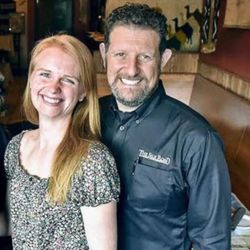
A Culinary Journey Across Continents: The Silk Road Catering & Spice
40:16|Sam and Elise Risho are the culinary heart and soul behind The Silk Road Catering & Spice in Missoula, Montana. Their story is rooted in decades of family food tradition and a passion for global flavors. Sam grew up in a restaurant family, learning the love of food and hospitality from his father and brother through years of working in local eateries and mastering fine-dining service and kitchen craft. In 2009 Sam and his brother, along with Elise, opened The Silk Road Restaurant to bring a tapas-style global tasting experience to the community. The restaurant’s success eventually blossomed into a thriving catering business and an artisanal spice line inspired by world cuisines. Elise plays a central role in running the business and shaping its creative vision as co-owner alongside Sam. Today they focus on crafting memorable menus for weddings and special events and sharing unique spice blends that reflect their commitment to exceptional hospitality and globally inspired cuisine.Show notes:00:03:49 - From Sheltered to Adventure: Building Community00:06:05 - Growing Up in a House of Hospitality00:07:53 - Adventures Before Kids Around the World00:10:03 - Custom Tailoring in Shanghai's French District00:12:13 - From Restaurant to Catering Adventures Across Montana00:14:11 - The Silk Road Inspired Spice Blends00:17:23 - From Spice Bags to Store Shelves00:20:54 - Finding Your Favorite Spice Blend00:23:04 - Adding Sour and Shopping Local00:25:46 - Community Spirit in Missoula, Montana00:28:30 - Hiking Adventures with Kids in Missoula00:30:49 - Keeping Missoula Weird Through Diversity00:32:56 - Embrace Slow Travel and Community Connection00:35:06 - Parenting Advice: Encourage Kids to Try New Things00:37:39 - Clark Fork River and The Wellerman Song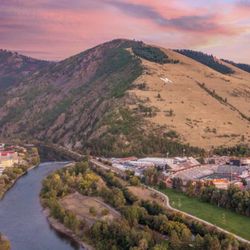
Missoula Spotlight: Aimee McQuilkin, Shane Clouse and Dave Stromeyer
01:05:08|Aimee McQuilkin is a Missoula entrepreneur and community builder, best known as the owner of Betty’s Divine and the Clark Fork Yacht Club. Through these beloved businesses, she has helped shape Missoula’s social and cultural fabric by creating welcoming spaces rooted in style, hospitality, and connection. Aimee’s work reflects a deep commitment to local economy, creativity, and gathering people together in meaningful ways.Shane Clouse is a Missoula musician and songwriter whose work blends Americana, folk, and roots traditions with thoughtful storytelling. His music is shaped by Montana landscapes and lived experience, carrying a quiet honesty that resonates both on stage and in more intimate listening spaces. Shane is a steady presence in the local music community, known for craft, collaboration, and authenticity.Dave Stromeyer is a Missoula County Commissioner focused on infrastructure, public service, and long term regional planning. He is currently working on a passenger railroad project aimed at improving transportation options and connectivity in western Montana. Dave’s work reflects a practical, forward looking approach to governance with an emphasis on public benefit, economic resilience, and sustainable mobility.Show notes:00:03:44 - 1983 Rabbit and Missoula Roots00:05:53 - Opening Betty's Divine While Pregnant00:09:34 - Building Community Through Shared Experiences00:11:56 - Community Heart and Entrepreneurial Joy00:13:23 - Homeownership Enables Community Business Growth00:15:39 - How Desmond the Mannequin Found Home00:18:12 - The Governor of the Hip Strip00:23:37 - Missoula's Deep History and Indigenous Stewardship00:27:39 - Gateway to the Rocky Mountains and Home00:32:15 - Stewardship and Restoring Passenger Rail00:38:12 - Keeping Missoula Special Through Community Involvement00:41:16 - Montana's State Song and Pink Grizzly Greenhouse00:44:10 - From Farm to Pink Grizzly Business00:46:39 - From Lumber Mills to Community Music00:50:32 - Historic Irrigation Ditch Sustains Missoula Community00:53:56 - Hunting and Fishing Fund Conservation00:58:58 - Montana Matters: A Song of Unity
Defending Wildlife as Public Trust: Frank Szollosi of the Montana Wildlife Federation
37:56|Frank Szollosi is the Executive Director of the Montana Wildlife Federation, the state’s oldest and largest wildlife conservation organization focused on protecting wildlife habitat, public lands access, and science-based natural resource policy in Montana. He took on this leadership role in June 2020 after a long career with the National Wildlife Federation, where he worked for over a decade on climate and water policy at the Great Lakes Regional Center and on national campaigns that defended public lands, advanced the Land and Water Conservation Fund, and connected people with wildlife. At MWF, Szollosi collaborates with state agencies including Montana Fish, Wildlife and Parks, tribal governments, landowners, businesses, and conservation partners to advance policies that sustain healthy wildlife populations and accessible wild places. He holds an undergraduate degree from the University of Utah and graduate degrees from the University of Michigan, and he brings extensive experience in government, including work as both a staffer and local elected official. Outside of his professional work, Szollosi is an avid outdoorsperson who has spent more than 25 years fly fishing and participates enthusiastically in annual hunts with friends and colleagues. He lives in Montana with his wife and four children and enjoys kayaking, downhill skiing, and backpacking. JOIN THE MONTANA WILDLIFE FEDERATION FOR ONLY $40/YEAR --> www.MontanaWildlife.orgShow notes:00:02:54 - Growing Up in Toledo, Ohio00:05:29 - Leading Montana Wildlife Federation00:08:26 - Finding Balance in Wildlife Conservation00:10:14 - Montana Wildlife Federation's Origins and Conservation History00:15:45 - Hunter-Funded Conservation: Montana's Legacy00:19:53 - Climate Change and Wildlife Conservation in Montana00:24:09 - Defending Public Lands Through Community Action00:26:17 - Montana Wildlife Federation's Advocacy Tools00:29:05 - Protecting Public Lands from Corporate Development00:31:30 - Montana Wildlife Federation Membership Benefits00:33:55 - Understanding Differences and Conservation Leadership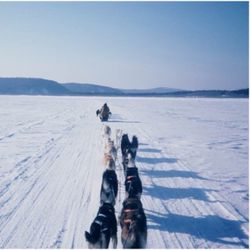
Iditarod Lessons: John Wood on Dogs, Distance, and Discipline
41:25|John Wood is an Alaska musher from Chugiak who started chasing the Iditarod Trail Sled Dog Race in the late nineteen seventies and went on to finish the thousand mile route to Nome four times in 1978, 1979, 1982 and 1986. Known for his dry humor and honesty about the grind of the trail, he once joked that after three runs he had “an unparalleled record of mediocrity” and zero prize money, yet if you asked whether he planned to run again his answer was “hell yes,” because the race embodied adventure, excitement, competition and camaraderie that felt uniquely Alaskan. John served as a musher representative on the Iditarod board and offered straight talking advice to rookies about staying upbeat, caring for their dog teams and setting realistic goals in a race where two weeks of little sleep and deep cold are the norm. The event he helped shape as a veteran competitor and mentor is itself legendary an annual March run from Anchorage to Nome of roughly one thousand miles across mountains, frozen rivers and Bering Sea coast, first completed in 1973 and often called the Last Great Race on Earth for its blend of brutal weather, wilderness travel and the deep historical ties between sled dogs and Alaska communities.Show Notes:00:02:37 - Growing Up in Alaska's Homestead00:06:29 - Mountain Life and Mining Adventures in Alaska00:09:32 - Getting into Dog Mushing with Trap Lines00:12:43 - Recording the Grand Canyon with John Wood00:16:32 - From Finishing to Competing in Iditarod00:18:59 - Iditarod Southern Route and Racing Strategy00:22:53 - Alaskan Huskies: Sled Dogs and Racing00:27:47 - Iditarod Dog Care and Rest Cycles00:30:52 - Sleep Strategy for Iditarod Success00:33:43 - Three Life Lessons from Iditarod Racing00:35:42 - Grand Canyon Evening and Iditarod Song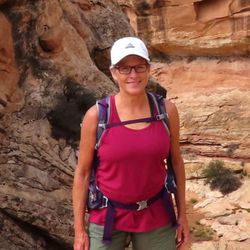
Listening to Nature: Master Naturalist, Kelly Dix.
46:18|Kelly Dix was raised in Lyndonville, NY, where time spent outside sparked her curiosity and awe of the natural world. She holds degrees in Mathematics, Environmental Sciences & Engineering, and Toxicology. Throughout her career in biomedical research she spent her spare time backpacking and exploring the mountain west with her husband. Kelly found her true passion in retirement, sharing her enthusiasm for science and nature with others. She’s been a substitute teacher and a volunteer with several environmental education non-profit organizations. After moving to Montana with her husband in 2016 Kelly found her home at MNHC and she has been involved with the VNS, Montana Master Naturalist, WOW, and other programs ever since. When she’s not volunteering at MNHC, you can find her at the Missoula Butterfly House and Insectarium, hiking almost anywhere, or taking way too many photos of just about anything in the natural world. Show notes:00:03:39 - Childhood Outdoor Play00:07:18 - Teamwork and Listening00:10:52 - Listening to Nature's Hidden Voices00:14:58 - From Math to Toxicology00:17:09 - Pharmacokinetics and Environmental Toxicology00:19:48 - Toxicology's Multidisciplinary Nature00:22:16 - Importance of Public Lands00:26:55 - Kelly Dix, Montana Naturalist00:31:02 - Visiting Naturalist in Schools00:34:26 - Hands-On Nature Education00:37:26 - Montana Master Naturalist Program00:42:23 - Montana Master Naturalists00:44:32 - Montana Natural History Center Info00:49:21 - Visiting Naturalist in SchoolsPlease help us keep the podcast version of the show advertisement free while also supporting our educational outreach efforts by donating $3/month on Patreon. To donate, visit Patreon.com/TrailLessTraveled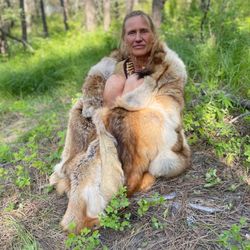
Return: A Journey Back to Living Wild
48:33|Lynx Vilden is a renowned author, wilderness guide, and ancestral skills teacher known for her immersive “Stone Age Projects,” where participants live off the land using only primitive tools and techniques. With over three decades of experience in earth-based living, Lynx has dedicated her life to reconnecting people with the rhythms of the natural world through traditional lifeways. Her teachings blend deep ecological awareness with hands-on instruction in skills such as hide tanning, fire-making, and shelter-building, inspiring a global movement toward rewilding and self-sufficiency. Her work has been featured in documentaries, books, and international media, and she continues to guide others on the path of ancestral remembrance and ecological belonging. In her stunning memoir Lynx Vilden chronicles her journey to reconnect with the earth, offering a model for how we all can nurture the wild around and inside ourselves.Show notes: 00:03:33 - Connection to Nature and Ancestral Skills00:07:06 - Finding My Path in Community00:10:12 - Importance of Community in Wilderness Skills00:13:54 - Exploring Stones by the River00:15:32 - Exploring Natural Elements for Survival00:17:19 - Exploring Earth, Water, and Fire00:20:12 - Indigenous Survival Skills and Practices00:24:33 - Learning Wilderness Skills with Lynx00:27:07 - Exploring Nature's Grandeur00:29:17 - Journeying Through the Wilderness00:33:48 - Understanding Our Safety Plan00:36:52 - Journey of Writing and Discovery00:39:34 - Exploring Non-Conventional Publishing Paths00:45:46 - Connecting with Nature and Moon PhasesPlease help us keep the podcast version of the show advertisement free while also supporting our educational outreach efforts by donating $3/month on Patreon. To donate, visit Patreon.com/TrailLessTraveled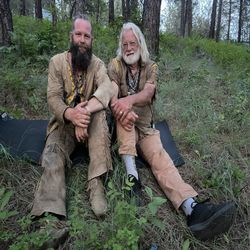
A Mountain Man Legacy of Hunting, Gathering & Primitive Wisdom
43:55|Dana Anderson, better known as Wild Mountain Man Dan, is a celebrated bushcraft instructor based in Matlock, Washington. Now 68, he has spent over six decades honing wilderness skills and teaching them to others. Dana has lived completely off the grid in a hand‑built cabin by a creek for more than three decades, cultivating a rich life subsisting on foraging, hunting, fishing, and primitive craftsmanship.A master of stone‑tool crafting, arrowhead chipping, primitive cooking, and stone‑age technologies, Dana has taught countless students in wilderness gatherings across the western U.S. He’s best known for leading shelter‑building and raft‑building challenges at the PNW Survival Games, emphasizing resourcefulness, survival principles, and hands‑on learning. With over 33 years off‑grid experience and ongoing instructor roles in events like PNW Survival Games, Dana shares not just skills but also deep respect for wild landscapes.Ean Anderson, Dana’s son, has followed in his father’s footsteps in a rugged way. As a veteran bear hunter and certified survival skills instructor, Ean blends traditional wilderness mastery with modern safety and technique. He specializes in teaching advanced tracking, big-game fieldcraft, and hands‑on wilderness preparedness.With a strong focus on black and brown bear hunting, Ean has earned a reputation for combining ethical hunting practices with deep survival know‑how. Drawing on his father's traditions and his own professional experience, Ean teaches both individual learners and groups how to thrive safely in bear‑inhabited wilderness—from crafting emergency shelters and gear improvisation to honing decision-making under pressure. Show notes: 00:04:26 - Childhood Adventures and Life Lessons00:08:03 - Growing Up in a Remote Town00:10:08 - Lessons from Childhood Hardship00:12:11 - Growing Up in Nature00:14:45 - Childhood Adventures in the Woods00:17:33 - Ancient Skills and Modern Gatherings00:19:59 - Traditional Survival Skills Overview00:24:05 - Traditional Hunting and Food Connection00:26:06 - Honoring Animals Through Sustainable Hunting00:28:09 - Respecting Nature Through Hunting00:30:56 - The Significance of Names00:33:41 - Finding Identity Through Names00:36:01 - Passion for Bear Hunting00:37:08 - Passion for Bear Hunting00:39:00 - Connection Between Hunting and Conservation00:41:48 - Understanding Nature's CluesPlease help us keep the podcast version of the show advertisement free while also supporting our educational outreach efforts by donating $3/month on Patreon. To donate, visit Patreon.com/TrailLessTraveled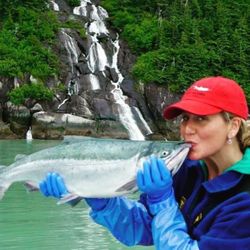
Salmon State: Alaska
48:27|Together, Tim, Heather, and Lindsey strengthen Salmon State’s mission: defending rivers and salmon through policy advocacy, community engagement, and protection of critical watersheds across Alaska and its transboundary rivers.As Executive Director based in Juneau, Alaska, Tim Bristol is a leading voice in salmon conservation policy. He has testified before the U.S. Senate Indian Affairs Committee, highlighting the urgent need to curb bycatch from large trawl fleets off Alaska and demanding stronger tribal co-management for rivers like the Arctic, Yukon, and Kuskokwim—calling salmon population crashes “a human rights crisis and an ecological disaster”. Under his leadership, SalmonState champions habitat protection and bycatch reduction, bringing Indigenous stewardship into fisheries management at both local and federal levels.In her role as Salmon Beyond Borders Campaign Advisor, Heather Hardcastle leads cross-jurisdictional efforts to protect salmon ecosystems that transcend political boundaries. Based in Juneau, she coordinates with stakeholders across Alaska and Canada to ensure the health of transboundary rivers—such as the Taku—by advocating science-based policy and Indigenous-led watershed governance. Her work helps strengthen salmon runs that cross national borders, safeguarding migratory pathways essential to species survival.A second-generation gillnet captain from Bristol Bay, Lindsey Bloom brings first-hand fishing experience and a background in sustainable development (M.A.) to her campaign strategy role. After more than a decade fishing, she now organizes Alaskans—particularly young fishermen—and collaborates with tribal, nonprofit, and business communities to protect salmon habitat and influence fisheries policy around rivers and coastal waters. She helped lead the grassroots movement opposing the Pebble mine in Bristol Bay, even addressing its importance during President Obama’s 2015 visit. https://salmonstate.org/Show notes: 00:05:16 - Connecting with Alaska's Natural Heritage00:08:17 - Protecting Transboundary Rivers Together00:11:36 - Impact of Mining on Wild Salmon00:17:30 - Advocating for Wildlife and Wild Places00:20:29 - Understanding Salmon Species00:21:50 - Salmon's Unique Life Cycles00:25:23 - Connection Between Fishing and Family00:28:20 - Protecting Alaska's Salmon Habitat00:31:24 - Protecting Alaska's Salmon Ecosystem00:34:19 - Tim Bristol's Conservation Journey00:36:45 - Protecting Southeast Alaska's Forests00:39:09 - Salmon State: Protecting Alaska's Ecosystem00:42:06 - Transboundary Rivers and Mining Issues00:44:39 - Lessons from Salmon ResiliencePlease help us keep the podcast version of the show advertisement free while also supporting our educational outreach efforts by donating $3/month on Patreon. To donate, visit Patreon.com/TrailLessTraveled